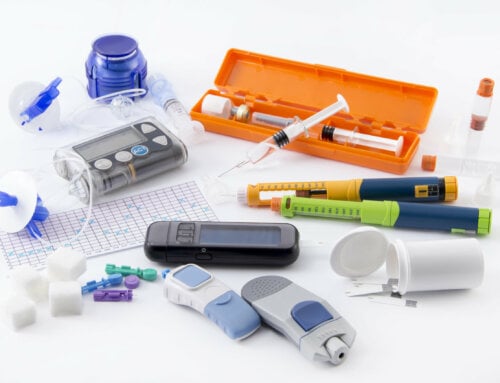Diabetes affects all the small blood vessels in your body, including your kidneys. Kidneys filter the blood. Blood removes waste products once collected and leave the body in the urine. Over a long period, exposure to high blood glucose levels and high blood pressure can damage the small blood vessels which are vital to proper kidney function.
When damaged, the kidneys can no longer filter the blood as well as before, so the waste products stay in the bloodstream and lost within the urine is products that the body needs. Known as nephropathy, as the nephrons, which are small filter in the kidneys, are damaged.
Please remember to request a copy of your blood work. Microalbumin is a blood test that can show the beginning of kidney problems. BUN (blood urea nitrogen) and creatinine are two blood tests, when elevated, show some damage already may be done to the kidneys. GFR (glomerular filtration rate), shows how well the they are functioning as filters.
In the early stages, the kidneys work harder to compensate for the damage, and there are usually no symptoms. Over years, as they deteriorate, they lose their ability to repair themselves. When this occurs, kidney damage can be life-threatening and may require a kidney transplant or regular treatment with an artificial kidney machine called dialysis.
What are the Possible Symptoms of Kidney Disease?
Not all people with diabetes suffer from kidney disease and those with kidney disease may not display any early symptoms. Others may suffer from a multitude of symptoms. These may include changes in urination frequency especially with an increase during the nighttime. Some may experience visible or microscopic blood in the urine. Swelling or fluid retention is common since the kidneys can no longer filter the fluid efficiently. The ankles, legs, feet, hands and face generally swell due to poor kidney function.
Many times, kidney disease causes “uremia” which is a buildup of excess waste products or toxins in the blood stream. This makes people feel nauseated, causes loss of appetite, may cause weight loss and the need to frequently vomit. Uremia can also produce a metallic taste in your mouth or foul breath. With uremia people tend to have vitamin/mineral deficiencies as well as possible malnutrition. Waste build up may cause rashes and skin patches around the body; many patients also develop severe and uncontrollable itching. Kidney disease may present with fatigue, chronic leg or back pain, weakness and the chills.
These symptoms are generally caused by anemia or lack of red blood cells related to the formation of EPO; a hormone that decreases as kidney disease becomes evident. Shortness of breath may signal anemia, as well. The lack of red blood cells makes it difficult to carry oxygen throughout the body; this lack of oxygen may cause dizziness and periods of memory loss.
Tips to Protect Your Kidneys
Basic Kidney Function 101: We have 2 kidneys that sit near the middle of your back, are the size of your fist and are shaped like kidney beans. Their job is to process blood – sift out waste and excess water, filter out drugs and chemicals; they also regulate blood pressure, maintain calcium levels and make red blood cells (RBC). The kidneys release certain hormones which help with these processes. Erythropoietin-EPO is a hormone made by the kidneys which stimulates your bone marrow to make RBCs. Another kidney hormone is rennin, which helps regulate blood pressure and the third one is calcitriol – an active form of vitamin D which helps bones maintain calcium and treat metabolic bone disease.
What effects kidney function? Uncontrolled diabetes and hypertension are the leading causes of kidney disease and kidney failure. Other causes may be untreated bladder and kidney infections. Certain medications and chemicals may cause damage to kidney function. “Nephrotoxic Medications” is medications that damage the kidneys. 5% of kidney failure, yearly, is due to taking pain medications. The kidneys process every drug that enters your body. Pain medication called NSAIDS – non-steroidal anti-inflammatory drugs may be harmful, especially when taken in high doses, over long periods of time. Included are aspirin, Naproxen and ibuprofen. Certain antibiotics, including Vancomycin (used to treat MRSA), may cause kidney damage.Diuretics or water pills influence kidney function, especially when you are already dehydrated, as well as ACE – inhibitors, both used to treat high blood pressure. HIV drugs and anti-viral medications may be detrimental to kidney function, after long-term use.
Even PPIs – proton pump inhibitors-used for reflux/Gerd can influence your kidneys. Heavy drinking of alcoholic beverages can reduce kidney function as well as contrast dyes used during MRIs or CT-scans. Always tell your physician who treats your kidneys, if you are starting a new medication or taking a special test. Diabetic nephropathy (a long- term diabetes complication) occurs when elevated blood sugars irritate and inflame the delicate nephrons of the kidney; this prevents them from doing their job. Uncontrolled blood pressure is detrimental to optimal kidney function. Treating your blood pressure is fine but make sure to monitor your kidney function as well. People over 65 have a higher incidence of kidney disease. African Americans, Asian Americans, Hispanics, Islanders, and Native Americans, as well as people who have a family history of kidney disease are also at a higher risk.
What tests should be done to check your kidney function? Your health care provider should be looking at kidney function by testing both blood and urine specimens. The urine should be tested for microalbumin (a protein which appears at the beginning of kidney problems) called proteinuria. Protein should stay in the body. The needed blood tests are GFR or glomerular filtration rate (measures how much blood the kidneys filter each minute) as well as serum creatinine level (a waste product that should be excreted) and BUN- blood, urea and nitrogen. A nephrologist, who specializes in kidney disorders, can do tests such as 24-hour urine collection, bladder and kidney ultrasounds and other scans. If kidney function is stable, it is usually checked once a year. If you have established kidney disease monitored it every 3 months when you check A1C.
How to Keep You and Your Kidneys Healthy
You can help prevent kidney problems and possibly avoid serious kidney disease by:
- Blood sugar control. Those people who can consistently maintain their A1C below 7%, have much less kidney involvement. (Ask your doctor what a good A1C level is for you).
- Blood pressure control. Most physicians treat blood pressure in people with diabetes even if it is not high. They generally prescribe an ACE inhibitor or ARB blood pressure medication (many people have an allergy to ACE inhibitors which presents as a dry, chronic cough). These specific medications treat blood pressure as well as protect kidney function. Many times, these medicines can reverse early protein in the urine. Generally, you should maintain a blood pressure of 130-140/80-85.
- Start eating a healthy, whole food plan emphasizing fruits, vegetables, and lean proteins-watch amounts of red meat, processed meats, eat low-fat dairy and small portions of grains including rye, oats, quinoa, millet, beans and legumes.
- Eliminate all sugar sweetened drinks. Additionally, eliminate all empty calorie snacks and processed foods.
- Stop smoking if you smoke and do not start!
- Watch cholesterol and triglyceride values. Also, take cholesterol/ triglyceride medication as directed, if your physician suggests it. Take all other medications, as prescribed.
- Treat urinary tract, bladder and kidney infections as soon as they start. Symptoms may include fever, chills, frequent urination, with or without a burning sensation, blood in the urine, cloudy or foul-smelling urine or low back pain. Take antibiotics as prescribed. Drink plenty of water to stay hydrated and keep urine clear.
- Partake in a moderate exercise routine. Do what you can to stay active.
- Limit caffeine. Limit alcoholic beverages. Men over 65 and all women are allowed 1 daily drink, if you drink. Check with your physician to see if drinking with your current medications is wise.
- Modify stress. Learn techniques such as deep breathing and meditation; use them daily.
- Know that obesity doubles your risk of kidney disease.
- Alert your physician about which vitamins and supplements you are taking; they may stress your kidney function.
- Lastly, see your internist, endocrinologist and/or nephrologist as least yearly or as recommended. Take proper urine and blood tests and monitor your results.
Understanding Three Specific Ways to Protect Your Kidneys
- Weight gain can increase blood sugar levels and cause high blood pressure. Additional weight overworks your body systems. Losing weight can help people with diabetes avoid fluctuating blood sugar levels, high blood pressure and possible kidney damage. Try to achieve close to your ideal body weight or at least lose 5-7% of your current body weight. This small amount will make a huge difference. If you are currently at an ideal weight, work hard to maintain it. Using portion control plates make weight management easier by clearly defining proper portion sizes. Eat consistently at mealtimes so you are not starving which may cause you to overeat.
- A low sodium diet minimizes the chance of developing kidney problems. Eating excess sodium makes it hard for your kidneys to get rid of the sodium and fluid from your body. They build in your bloodstream and tissues, which can lead to high blood pressure and possible renal disease. The recommended daily intake of sodium for people with diabetes is about 1200-1500 milligrams, which is less than one teaspoon of salt. Frozen and packaged foods as well as canned soups, condiments, salad dressings and gravies often contain high sodium levels. Never add salt to flavor your food. Use fresh herbs or spice blends that do not contain salt. Add citrus slices for flavor. Meet with a registered dietitian, especially if your provider suggests a modified food plan limiting protein, fluids, potassium or phosphorous.
- Controlling your A1C is very important to avoid kidney problems. An A1C test measures your average blood glucose control for the past three months. Have your A1C checked about every three months or as the physician recommends. Continue to regularly monitor blood glucose levels at home. Therefore, watch blood sugar trends on a daily basis and document them. Let your doctor know if they become too high or low.
Kidney disease does not have to happen, with or without diabetes. Keep control of your blood pressure, blood sugar, weight and maintain other over-all healthy habits; this will help decrease your risk of future kidney problems. Take control of your kidneys and you will be thankful!







Leave A Comment